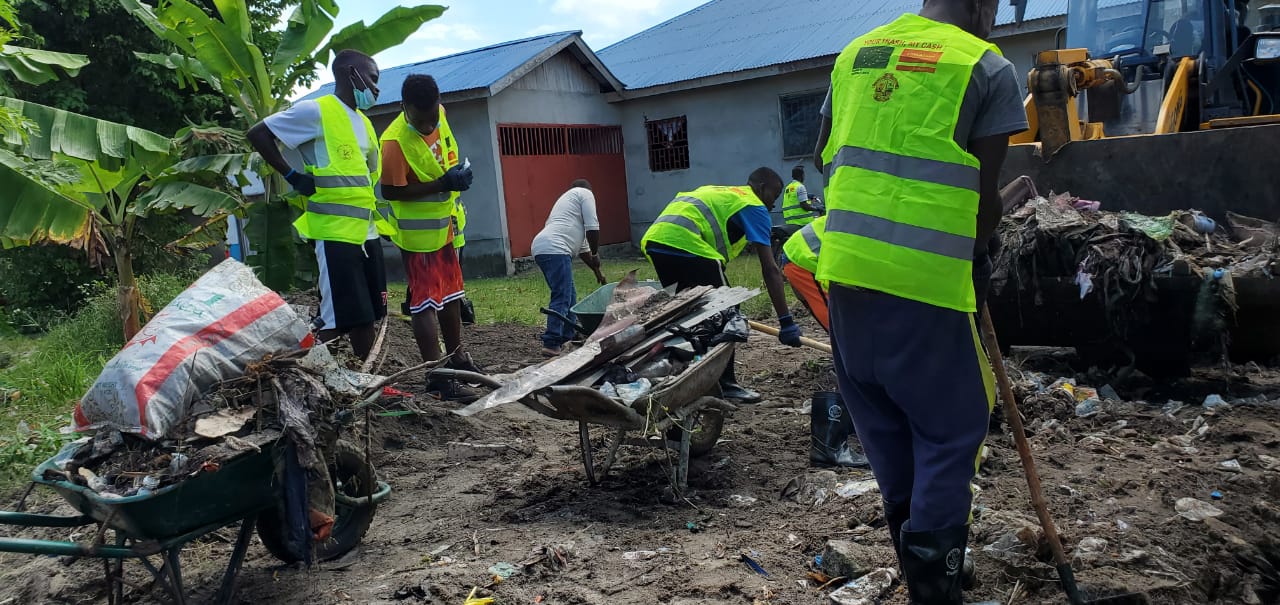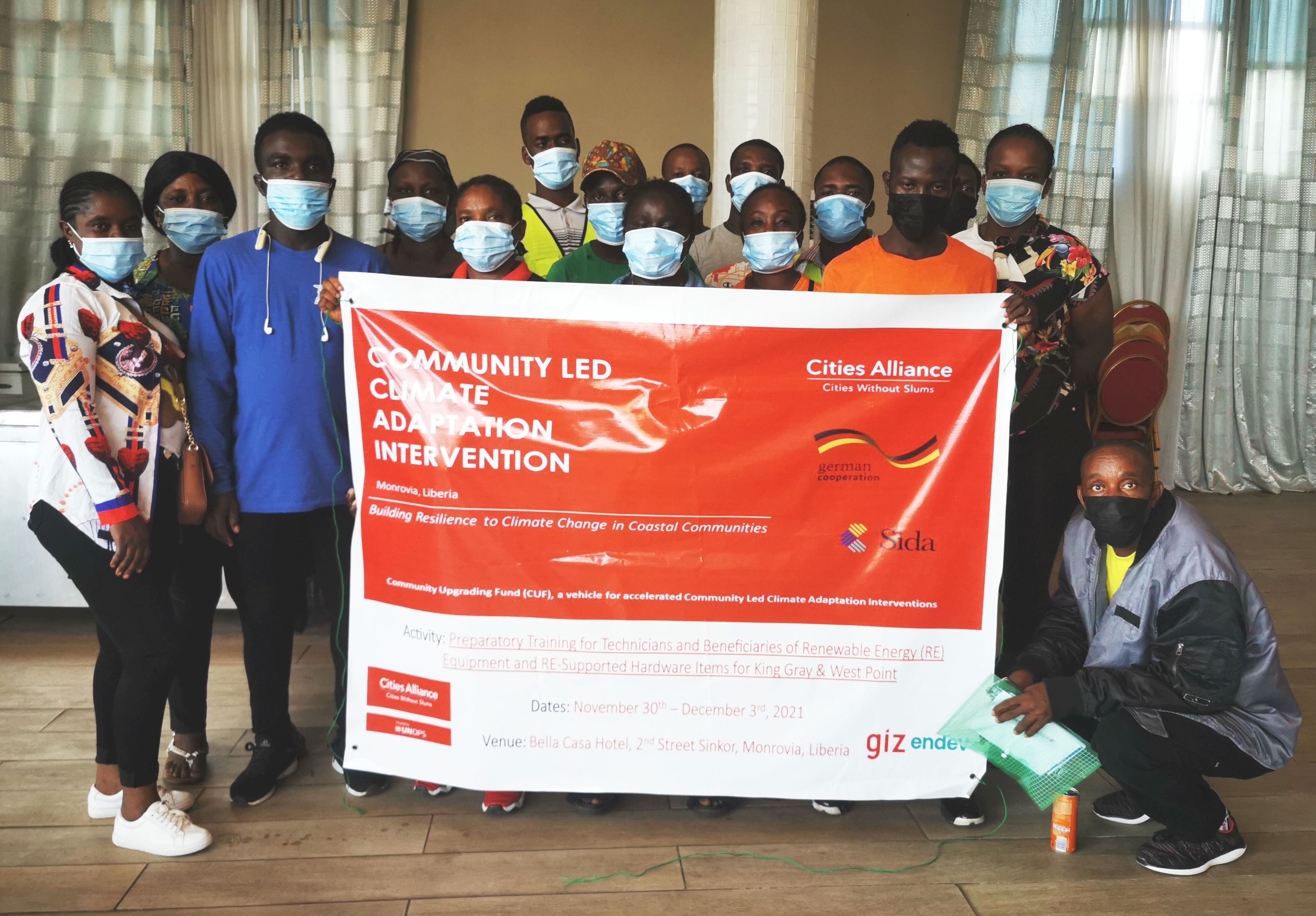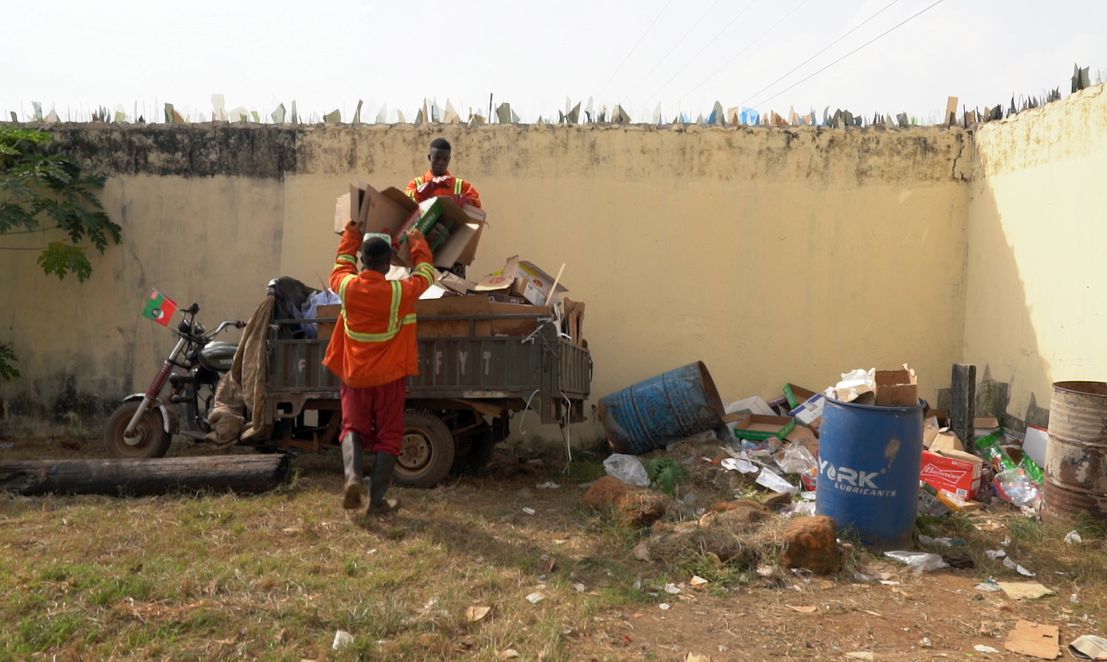Building more resilient communities through inclusive urban governance, waste management and climate adaptation.
National-level projects, implemented through members and local partners, focused on laying the foundations for a National Urban Policy with UN Habitat; interventions
on affordable housing solutions and housing microfinance viability with Habitat for Humanity international (HFHI): and developing guidelines for a voluntary gender-responsive policy to protect vulnerable relocated communities.
The Cities Alliance Liberia Country Programme (LCP) provides long-term, programmatic support to help Liberia realise its developmental objectives in a way that benefits the majority of the urban poor. Launched in 2016 with funding from Comic Relief, it is an ambitious, (initially) five-year, multi-level urban development programme that aims to improve the lives and opportunities of up to 400,000 slum dwellers in Greater Monrovia. It also includes two projects on primary waste collection (2018–2021) and innovative waste-to-energy initiatives (2018–2020) funded by the EU.
Cities Alliance coordinates the LCP through a Programme Steering Committee, which oversees implementation. International development partners include United Cities and Local Governments Africa (UCLGA), UN-Habitat, SDI, Comic Relief, DFID, Internationa Growth Centre, WIEGO, StreetNet International, HFHI, UNOPS, and the YMCA.
In partnership with the Ministry of Internal Affairs, UN-Habitat, with support from the Secretariat in Monrovia, undertook the process of developing a national urban policy for Liberia. In 2019, the project moved from the feasibility to diagnostic phase, with several regional and mayoral consultations taking place despite issues such as data gaps and political transitions. These consultations are designed to provide the groundwork for developing a policy in 2020 that reflects pro-poor agenda issues and provides a sustainable framework to guide urban development.
The second National Urban Forum, held in Monrovia in November 2019, helped consolidate the consensus needed to shape the NUP. Over 250 participants came together to address their common challenges, share their voices, and explore how to ensure the prosperity of Liberia’s cities. The Cities Alliance team conducted extensive local media outreach about the forum to engage the general public and raise awareness of urban issues.
To support in-country capacity development and the NUP process, the IHS has been tasked by the Secretariat to design a capacity-building programme, to be implemented with the Liberian Institute of Public Administration (LIPA) in 2020. The capacity building will benefit national- and city-level officers, as well as members of Community Based Enterprises9 engaged in city planning and management, solid waste management, and water management at the community level.
Increasing the provision of affordable housing for the urban poor
After establishing a Slum Upgrading Unit in 2017 and adopting a Slum Upgrading and Affordable Housing Framework in close engagement with HFHI, the National Housing Authority (NHA) in 2019 focused its interventions on slum upgrading and constructing affordable housing. It made clear commitments, set ambitious targets, and entered partnerships with the private sector and financial institutions to provide 61,000 affordable housing units by 2022.
In 2019, HFHI and the NHA, with the support of the Cities Alliance, engaged micro finance and building supply firms to pilot and validate innovative affordable housing solutions and housing microfinance viability. These interventions have the potential to scale up and increase the availability of low-cost housing in line with the national agenda.
However, the recent reality in Liberia has seen NHA staff struggling to be paid and not being provided with the necessary resources to perform their tasks. Following staff protests due to the situation, the NHA downsized the team, including five members from the Slum Upgrading Unit trained in affordable housing and slum upgrading initiatives. This led to a setback within the NHA, the Country Programme, and HFHI.
With support from HFHI, a partnership was established with the micro finance institution Foundation for Women Liberia that will deliver the housing finance products to low income population groups. HFHI also strengthened competencies in disaster risk management, training 30 staff from 11 Liberian agencies as Participatory Approach for Safe Shelter Awareness (PASSA) facilitators.
The process identified three main hazards in the slum community of Peace Island and initiated a community infrastructure project comprised of a community social hall for youth and a waste facility.
Proactive voluntary relocation to protect vulnerable communities
Within the Country Programme, the Secretariat in Monrovia supported HFHI to develop a set of guidelines for a Voluntary Gender-Responsive Policy, currently in the process of being adopted by the government. The guidelines embed engagement, coordination, and respect for human rights to ensure a proactive and voluntary relocation process. The tool aims at protecting vulnerable communities, particularly women, from environmental risks and hazards, and preventing the loss of life and property. HFHI led consultations in 12 communities to gather perceptions, experiences, lessons learned, and recommendations from people directly affected by relocation processes. In April 2019, these findings were presented at a two-day roundtable discussion that included 60 participants from government, Cities Alliance partners, and slum communities impacted by sea erosion, flooding, insecure land tenure and extreme poverty.
A city development strategy for Greater Monrovia begins to take shape The Country Programme is supporting a strategic planning process to provide a long-term, strategic framework for Greater Monrovia.
During 2019, the process moved out of the preparatory phase with the launch of an inclusive assessment for a Greater Monrovia CDS. Citizens are closely involved in the CDS through city forums and thematic group discussions, where they exchange views, debate priorities and agree on common actions.
A Rapid City Assessment tool was developed to help collect vital CDS information on five thematic areas (Governance, Citizenship, Services, Economy and Environment) and is guiding the preparation for the CDS. See separate tab for more information of the EU Waste Management Projects
Saving groups empower community engagement in Greater Monrovia
Saving groups build an active, informed citizenry and assist communities by bringing together slum dwellers with a common purpose of saving resources to expand business opportunities.
In 2019, as part of the Country Programme, the Secretariat funded SDI and YMCA to support 226 saving groups and strengthen their capacities. Some 798 members received financial literacy training, and 44 savings groups received support to open bank accounts.
Savings group membership grew to over 8,000 (of which 87% are women) in 2019, and they have provided the critical mass required for community engagement in governance.
The Federation of Liberia Urban Poor Savers (FOLUPS) has played an important role in organising saving groups and mobilising communities. Over the year, FOLUPS convened 110 settlement forums to channel voices from the communities to the city level and ultimately the National Urban Forum.
The landmark Memorandum of Understanding (MoU) signed between MCC and FEPTIWUL in 2018 has greatly improved working conditions for Monrovia’s petty traders, who have experienced much less harassment and merchandise confiscation.
The MCC also provides FEPTIWUL with workspace in City Hall to handle issues with the traders. The agreement has worked because all parties involved are engaged in its implementation.
Other cities are now replicating Monrovia’s successful approach to petty traders. The mayor of Gompa City initiated engagement with traders and signed an MoU with them that was modelled after the best practice from Monrovia. In addition, five members of FEPTIWUL’s leadership visited their sister organisation in Freetown, the Sierra Leone Traders’ Union, in order to share the experience of securing and implementing the MoU in Monrovia.
Small Community Upgrading Fund infrastructure projects deliver big impact The Cities Alliance CUF is a community-driven development initiative that provides financing for small infrastructure projects selected by the communities themselves. The projects, with budgets ranging from $5,000 to $30,000, enable the urban poor to impact their communities by improving basic social and physical infrastructure.
They are chosen based on information collected through community profiling activities and priorities identified by the communities.
13 Cities Alliance plans to reach 60 profiled settlements and slum communities with CUF projects, benefiting 400,000 people in Greater Monrovia by 2021. The CUF has already been institutionalised and is delivering results for the urban poor.
In 2019, its Board Charter, Standard Operating Procedures, and Terms of Reference for implementation were finalised, agreed, and signed by local authorities.
Nine pilot projects in three slum settlements in Greater Monrovia were completed during the year, including six water kiosks, a shower facility, and a kindergarten in West Point. For the next round of projects, a total of 54 community requests were submitted through YMCA Liberia for consideration, and of these, the CUF Board approved 35 community requests and 60 projects for implementation.
Watch Our Video
The voice of the urban poor [is] playing a critical role in shaping resilient and inclusive urbanisation
Independent mid-term evaluation of the Liberia Programme 2019





